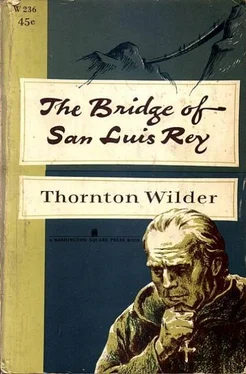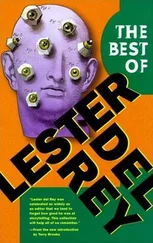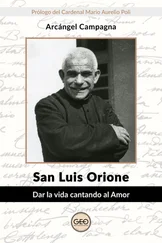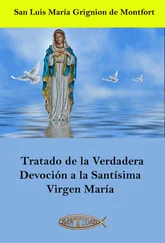“Who is there?” asked the beautiful voice.
Uncle Pio remained silent.
Camila said again in a tone edged with impatience:
“Who is there? Who is there weeping?”
“Doña Micaela, my lady, I beg of you to come here to me.”
“Who are you and what do you want?”
“I am a poor girl. I am Estrella. I beg of you to come and help me. Do not call your maid. I pray you, Doña Micaela, to come yourself.”
Camila was silent a moment, then said abruptly: “Very well,” and closed the shutter. Presently she appeared around the corner of the house. She wore a thick cloak that dragged in the dew. She stood at a distance and said: “Come over here to where I am standing,—Who are you?”
Uncle Pio rose up. “Camila, it is I,—Uncle Pio. Forgive me, but I must speak to you.”
“Mother of God, when shall I be free of this dreadful person! Understand: I want to see no one. I don’t want to speak to a soul. My life is over. That is all.”
“Camila, by our long life together, I beg of you to grant me one thing. I shall go away and never trouble you again.”
“I grant you nothing, nothing. Stay away from me.”
“I promise you I shall never trouble you again if you listen to me this once.” She was hurrying around to the door on the other side of the house and Uncle Pio was obliged to run beside her to make sure that she heard what he was saying. She stopped:
“What is it then? Hurry. It is cold. I am not well. I must go back to my room.”
“Camila, let me take Don Jaime for a year to live with me in Lima. Let me be his teacher. Let me teach him the Castilian. Here he is left among the servants. He is learning nothing.”
“No.”
“Camila, what will become of him? He has a good mind and he wants to learn.”
“He is sick. He is delicate. Your house is a sty. Only the country is good for him.”
“But he has been much better these last few months. I promise you I shall clean out my house. I shall apply to Madre María del Pilar for a housekeeper. Here he is in your stables all day. I shall teach him all that a gentleman should know, fencing and Latin and music. We shall read all. . . .”
“A mother cannot be separated from her child like that. It is impossible. You are crazy to have thought of it. Give up thinking of me and of everything about me. I no longer exist. I and my children will get on as best we can. Do not try to disturb me again. I do not want to see any human being.”
Now it was that Uncle Pio felt obliged to use a hard measure. “Then pay me the money that you owe me,” he said.
Camila stood still, confounded. To herself she said: “Life is too fearful to bear. When may I die?” After a moment she answered him, in a hoarse voice: “I have very little money. I will pay you what I can. I will pay you now. I have a few jewels here. Then we need never see one another again.” She was ashamed of her poverty. She took a few steps, then turned and said: “Now I see that you are a very hard man. But it is right that I pay you what I owe you:
“No, Camila, I only said that to enforce my request. I shall take no money from you. But lend me Don Jaime for one year. I shall love him and take every care of him. Did I harm you? Was I a bad teacher to you in those other years?”
“It is cruel of you to keep urging gratitude, gratitude, gratitude. I was grateful, good, good! but now that I am no longer the same woman there remains nothing to be grateful for.” There was a silence. Her eyes were resting on the star that seemed to be leading forth the whole sky in its wonder. A great pain lay at her heart, the pain of a world that was meaningless. Then she said: “If Jaime wishes to go with you, very well. I shall talk to him in the morning. If he wishes to go with you, you will find him at the Inn about noon. Good night. Go with God.”
“Go with God.”
She returned to the house. The next day the grave little boy appeared at the Inn. His fine clothes were torn and stained now and he carried a small bundle for change. His mother had given him a gold piece for spending money and a little stone that shone in the dark to look at in his sleepless nights. They set off together in a cart, but soon Uncle Pio became aware that the jolting was not good for the boy. He carried him on his shoulder. As they drew near to the bridge of San Luis Rey, Jaime tried to conceal his shame for he knew that one of those moments was coming that separated him from other people. He was especially ashamed because Uncle Pio had just overtaken a friend of his, a sea-captain. And just as they got to the bridge he spoke to an old lady who was travelling with a little girl. Uncle Pio said that when they had crossed the bridge they would sit down and rest, but it turned out not to be necessary.
Part Five: Perhaps an Intention
A NEW bridge of stone has been built in the place of the old, but the event has not been forgotten. It has passed into proverbial expressions. “I may see you Tuesday,” says a Limean, “unless the bridge falls.” “My cousin lives by the bridge of San Luis Rey,” says another, and a smile goes around the company, for that also means under the sword of Damocles. There are some poems about the accident, classics to be found in every Peruvian anthology, but the real literary monument is Brother Juniper’s book.
There are a hundred ways of wondering at circumstance. Brother Juniper would never have arrived at his method had it not been for his friendship with a certain master in the University of San Martin. This student’s wife had stolen away one morning on a boat for Spain, following a soldier, and had left him the care of two daughters in their cradle. He was possessed of all the bitterness that Brother Juniper lacked and derived a sort of joy from the conviction that all was wrong in the world. He whispered into the Franciscan’s ear such thoughts and anecdotes as belied the motion of a guided world. For a moment a look of distress, almost of defeat, would come into the Brother’s eyes; then he would begin patiently explaining why such stories held no difficulty for a believer. “There was a queen of Naples and Sicily,” the student would say, “who discovered that she was carrying an angry tumour in her side. In great dismay she commanded her subjects to fall to their prayers and ordered that all the garments in Sicily and Naples be sewn with votive crosses. She was well loved by her people and all their prayers and embroideries were sincere, but ineffectual. Now she lies in the splendor of Monreale, and a few inches above her heart may be read the words: I shall fear no evil .”
It was by dint of hearing a great many such sneers at faith that Brother Juniper became convinced that the world’s time had come for proof, tabulated proof, of the conviction that was so bright and exciting within him. When the pestilence visited his dear village of Puerto and carried off a large number of peasants, he secretly drew up a diagram of the characteristics of fifteen victims and fifteen survivors, the statistics of their value sub specie aeternitatis . Each soul was rated upon a basis of ten as regards its goodness, its diligence in religious observance, and its importance to its family group. Here is a fragment of this ambitious chart:
Goodness Piety Usefulness
Alfonso G. 4 4 10
Nina 2 5 10
Manuel B. 10 10 0
Alfonso V. -8 -10 10
Vera N. 0 10 10
The thing was more difficult than he had foreseen. Almost every soul in a difficult frontier community turned out to be indispensable economically, and the third column was all but useless. The examiner was driven to the use of minus terms when he confronted the personal character of Alfonso V., who was not, like Vera N., merely bad: he was a propagandist for badness and not merely avoided church but led others to avoid it. Vera N. was indeed bad, but she was a model worshipper and the mainstay of a full hut. From all this saddening data Brother Juniper contrived an index for each peasant. He added up the total for victims and compared it with the total for survivors, to discover that the dead were five times more worth saving. It almost looked as though the pestilence had been directed against the really valuable people in the village of Puerto. And on that afternoon Brother Juniper took a walk along the edge of the Pacific. He tore up his findings and cast them into the waves; he gazed for an hour upon the great clouds of pearl that hang forever upon the horizon of that sea, and extracted from their beauty a resignation that he did not permit his reason to examine. The discrepancy between faith and the facts is greater than is generally assumed.
Читать дальше












